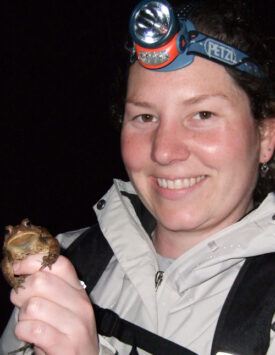Christine completed a Ph.D. in 2011 in Dr. Bill Hopkins’ Wildlife Ecotoxicology and Physiological Ecology program in the Department of Fisheries and Wildlife Sciences at Virginia Tech. Her research focused on the maternal transfer and reproductive effects of mercury in amphibians. She is now a postdoctoral fellow with Dr. W. Gregory Cope in the Department of Environmental and Molecular Toxicology at North Carolina State University.
Growing up on the coast of Maine fostered her passion for environmental conservation from an early age. Her academic background is diverse, ranging from an undergraduate degree in biology from Assumption College in Worcester, MA to a Master’s degree in Marine, Estuarine, and Environmental Science through the University of Maryland’s Chesapeake Biological Laboratory. During her Master’s, Christine specialized in environmental chemistry and investigated the impact of sediment resuspension on mercury cycling and the bioaccumulation of methylmercury into benthic and pelagic organisms.
Christine’s Master’s research mainly focused on the chemistry of mercury in terms of its fate, transport, and bioaccumulation. Her research in the Hopkins’ Lab allowed her to combine the knowledge she gained regarding chemical concentrations in the environment with an ecological perspective to tackle complex interdisciplinary questions in wildlife ecotoxicology. Christine used a variety of field and laboratory techniques to examine the individual and interactive effects of maternally- and trophically-derived mercury on growth and development in American toad (Bufo americanus) embryos, larvae, and juveniles.
Christine is now a Postdoctoral Scholar at North Carolina State University in the Department of Environmental & Molecular Toxicology.

